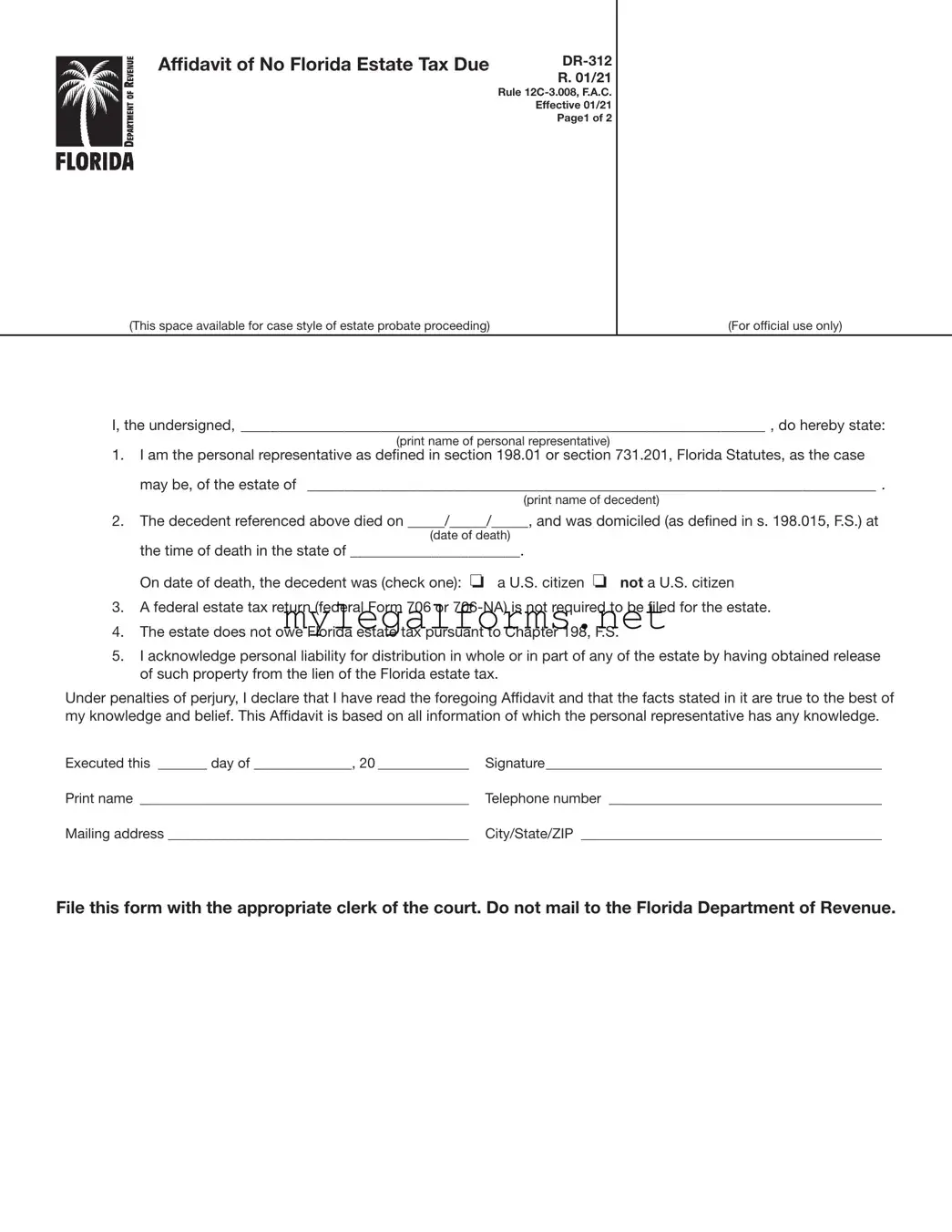Affidavit of No Florida Estate Tax Due
Rule 12C-3.008, F.A.C.
Effective 01/21
Page1 of 2
(This space available for case style of estate probate proceeding) |
(For official use only) |
I, the undersigned, _______________________________________________________________________ , do hereby state:
(print name of personal representative)
1.I am the personal representative as defined in section 198.01 or section 731.201, Florida Statutes, as the case may be, of the estate of _____________________________________________________________________________ .
(print name of decedent)
2.The decedent referenced above died on _____/_____/_____, and was domiciled (as defined in s. 198.015, F.S.) at
(date of death)
the time of death in the state of _______________________.
On date of death, the decedent was (check one): o a U.S. citizen o not a U.S. citizen
3.A federal estate tax return (federal Form 706 or 706-NA) is not required to be filed for the estate.
4.The estate does not owe Florida estate tax pursuant to Chapter 198, F.S.
5.I acknowledge personal liability for distribution in whole or in part of any of the estate by having obtained release of such property from the lien of the Florida estate tax.
Under penalties of perjury, I declare that I have read the foregoing Affidavit and that the facts stated in it are true to the best of my knowledge and belief. This Affidavit is based on all information of which the personal representative has any knowledge.
Executed this _______ day of ______________, 20 _____________ |
Signature________________________________________________ |
Print name _______________________________________________ |
Telephone number _______________________________________ |
Mailing address ___________________________________________ |
City/State/ZIP ___________________________________________ |
File this form with the appropriate clerk of the court. Do not mail to the Florida Department of Revenue.
DR-312
R. 01/21
Page 2 of 2
Instructions for Completing Form DR-312
File this form with the appropriate clerk of the court. Do not mail to the Florida Department of Revenue.
General Information
If Florida estate tax is not due and a federal estate tax return (federal Form 706 or 706-NA) is not required to be filed, thepersonal representatives of such estates should complete Florida Form DR-312, Affidavit of No Florida Estate Tax Due. Note that the definition of “personal representative” in Chapter 198, F.S., includes any person who is in actual or constructive possession. Therefore, this affidavit may be used by “persons in possession” of any property included in the decedent’s gross estate.
Form DR-312 is admissible as evidence of nonliability for Florida estate tax and will remove the Department’s estate tax lien. The Florida Department of Revenue will no longer issue Nontaxable Certificates for estates for which the DR-312 has been duly filed and no federal Form 706 or 706-NA is due.
The 3-inch by 3-inch space in the upper right corner of the form is for the exclusive use of the clerk of the court. Do not write, mark, or stamp in that space.
Where to File Form DR-312
Form DR-312 must be recorded directly with the clerk of the circuit court in the county or counties where the decedent owned property. Do not send this form to the Florida Department of Revenue.
When to Use Form DR-312
Form DR-312 should be used when an estate is not subject to Florida estate tax under Chapter 198, F.S.,
and a federal estate tax return (federal Form 706 or 706-NA) is not required to be filed. NOTE: This form may NOT be used for estates that are required to file federal form 706 or 706-NA.
Federal thresholds for filing federal Form 706 only: (For informational purposes only. Please confirm with Form 706 instructions.)
Date of Death |
Dollar Threshold |
(year) |
for Filing Form 706 |
|
(value of gross estate) |
|
|
2000 and 2001 |
$675,000 |
|
|
2002 and 2003 |
$1,000,000 |
|
|
2004 and 2005 |
$1,500,000 |
|
|
For 2006 and forward |
|
go to the IRS website at |
|
www.irs.gov to obtain |
|
thresholds. |
|
|
|
For thresholds for filing federal Form 706-NA (nonresident alien decedent), contact your local Internal Revenue Service office.
If an administration proceeding is pending for an estate, Form DR-312 may be filed in that proceeding. The case style of the proceeding should be added in the large blank space in the upper left portion of the DR-312. Form DR-312 should be filed with the clerk of the court and duly recorded in the public records of the county or counties where the decedent owned property.
To Contact Us
Information, forms, and tutorials are available on the Department’s website floridarevenue.com
If you have any questions, or need assistance, call Taxpayer Services at 850-488-6800, Monday through Friday, excluding holidays.
To find a taxpayer service center near you, go to: floridarevenue.com/taxes/servicecenters
For written replies to tax questions, write to: Taxpayer Services - Mail Stop 3-2000 Florida Department of Revenue
5050 W Tennessee St Tallahassee FL 32399-0112
Subscribe to Receive Email Alerts from the Department.
Subscribe to receive an email when Tax Information Publications and proposed rules are posted to the Department’s website. Subscribe today at floridarevenue.com/dor/subscribe.
Reference Material
Rule Chapter 12C-3, Florida Administrative Code and Chapter 198, Florida Statutes. Tax statutes and rules are available online at: https://revenuelaw.floridarevenue.com



